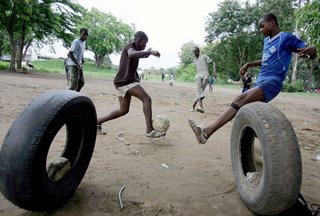 There are times when I hear the words “peace process” and “middle east” within the same breath and a wave of nausea washes over me. It seems to be a reflex that has developed over years of having heard one thing and then, barely a moment later, being told that the first “something” that I heard is either entirely incorrect, or that the person (or organization) conveying the information is totally irresponsible for making the assertions encapsulated by that “something”. There is also the very real chance that there is something “new” to refute what has barely had a chance to be mulled over, having only been heard a few heartbeats ago.
There are times when I hear the words “peace process” and “middle east” within the same breath and a wave of nausea washes over me. It seems to be a reflex that has developed over years of having heard one thing and then, barely a moment later, being told that the first “something” that I heard is either entirely incorrect, or that the person (or organization) conveying the information is totally irresponsible for making the assertions encapsulated by that “something”. There is also the very real chance that there is something “new” to refute what has barely had a chance to be mulled over, having only been heard a few heartbeats ago.Introduce the word “Israel” into the mix and I’m likely to fly into a screaming fit with bits of foam coming out of my mouth and other less mentionable things coming out of several other orifices. Don’t confuse this with being “anti-Semitic”, or even “anti-Israel” – neither is the case. I disagree with the policies of the “State” of Israel, and do not for one minute believe that Israel has the right to exist as a “Jewish Only” State. That, by definition, is state enforced racism and is wrong on so many levels a book (a library of books) could be written to explain the wrongness of that concept.
 What drives me completely crazy – what drives me to distraction, and beyond – about Israel (and the “peace process”) is the seeming historical ignorance and insensitivity continuously displayed by the people in power in Isael. This is a group of people who, if you know anything about the history of the twentieth century and even the smallest amount about the persecution of the Jews during the decades that preceded the holocaust, you would expect that these leaders would go out of their way to get along with their neighbours.
What drives me completely crazy – what drives me to distraction, and beyond – about Israel (and the “peace process”) is the seeming historical ignorance and insensitivity continuously displayed by the people in power in Isael. This is a group of people who, if you know anything about the history of the twentieth century and even the smallest amount about the persecution of the Jews during the decades that preceded the holocaust, you would expect that these leaders would go out of their way to get along with their neighbours.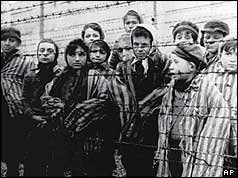 Knowing what Jews have gone through in history, I would expect that the ones living in Israel (that any, anywhere) would be vocal supporters and advocates of living in peace with all faiths and ethnic groups, because when living under the Third Reich they were selected out of diverse groups and sent to their deaths, along with any others that had been labelled as the untermenschen, the “sub-humans”. The Nazis didn’t only exterminate Jews (despite what the historical revisionists would like us to believe), their proclivities for expressing their mass psychosis meant the deaths of numerous Poles, Soviets and other prisoners of war. The Nazi state also found pleasure in the destruction of the disabled (euthanasia), and the degenerates (the homosexuals), the gypsies and Jehovah's Witnesses. There were others, of course, but this just gives a tiny glimpse of the extreme evil that went into shaping the character of those who survived. Millions of concentration camp prisoners were killed through mistreatment, disease, starvation and overwork.
Knowing what Jews have gone through in history, I would expect that the ones living in Israel (that any, anywhere) would be vocal supporters and advocates of living in peace with all faiths and ethnic groups, because when living under the Third Reich they were selected out of diverse groups and sent to their deaths, along with any others that had been labelled as the untermenschen, the “sub-humans”. The Nazis didn’t only exterminate Jews (despite what the historical revisionists would like us to believe), their proclivities for expressing their mass psychosis meant the deaths of numerous Poles, Soviets and other prisoners of war. The Nazi state also found pleasure in the destruction of the disabled (euthanasia), and the degenerates (the homosexuals), the gypsies and Jehovah's Witnesses. There were others, of course, but this just gives a tiny glimpse of the extreme evil that went into shaping the character of those who survived. Millions of concentration camp prisoners were killed through mistreatment, disease, starvation and overwork.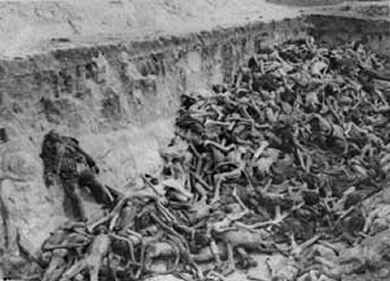 Killed is a word often used when describing the act of a person losing their life over the course of a conflict; but I believe it is too weak a word to effectively convey what transpired during the holocaust and what is going on today in the middle east. Murder, on the other hand, approaches the flavour of the acts. Genocide … now that word, even more than the previous two, seems more appropriate to generate the requisite outrage for the present situation taking place in Israel.
Killed is a word often used when describing the act of a person losing their life over the course of a conflict; but I believe it is too weak a word to effectively convey what transpired during the holocaust and what is going on today in the middle east. Murder, on the other hand, approaches the flavour of the acts. Genocide … now that word, even more than the previous two, seems more appropriate to generate the requisite outrage for the present situation taking place in Israel.It would be very easy to post links to dozens of articles that purport to answer the question as to why things are the way they are in Israel, but in the end, I don’t really give a damn. I’m sorry, I really don’t. I don’t care why anyone goes to war; all that means to me is that there has been a failure in our species as we take a step backwards and resort to violence to settle problems that we should be able to settle through other means.
 Does it matter to me that Israel is the “Jewish” homeland, and should be indivisible, a land given to the children of Israel by the Lord God Almighty as a fulfilment of Holy Scripture? You’re kidding, right? If it means that everyone can live there in peace, in an eternity of bliss, then absolutely. If it means that the State of Israel is going to fight over dusty tracts in the Negev desert (and other glamorous locals, suitable for postcards masquerading as images from the moon), NO.
Does it matter to me that Israel is the “Jewish” homeland, and should be indivisible, a land given to the children of Israel by the Lord God Almighty as a fulfilment of Holy Scripture? You’re kidding, right? If it means that everyone can live there in peace, in an eternity of bliss, then absolutely. If it means that the State of Israel is going to fight over dusty tracts in the Negev desert (and other glamorous locals, suitable for postcards masquerading as images from the moon), NO.  Let’s get one thing straight before anyone starts goose-stepping over my burning effigy, I am not sitting here in lederhosen, smacking my lips over the possible demise over the Jewish state; on the contrary, while I do consider myself to be Jewish (on both sides of my family, for as far back as the eye can see), the last thing that I would ever consider myself is a Zionist. The idea that the Jews living in Israel cannot live peacefully with non-Jews only tells me one thing: the lessons of history were wasted.
Let’s get one thing straight before anyone starts goose-stepping over my burning effigy, I am not sitting here in lederhosen, smacking my lips over the possible demise over the Jewish state; on the contrary, while I do consider myself to be Jewish (on both sides of my family, for as far back as the eye can see), the last thing that I would ever consider myself is a Zionist. The idea that the Jews living in Israel cannot live peacefully with non-Jews only tells me one thing: the lessons of history were wasted.It is worth noting the interspersed pictures in this post at this point. I will euphemistically call them (just to annoy people) “character building” for Israel, and anyone else who wants to look at history. The Nazis were not especially careful about their segregation of prisoners once they were inside the concentration camps. After the men and women were separated the likelihood of a Jew finding himself interred with a Pole was very likely. Gypsy and Russian. Untermenschen all, and that was the point.
 Israel must learn – the world must learn – the lessons that the millions of lives lost gave us in terms that could not be made more eloquent with words: living in peace with your neighbour is a matter of life and death. If we do not get along with our neighbours we desecrate the memories of every life lost in the holocaust, of every child murdered, of every scream silenced by the hand of a cold-blooded killer. This isn’t about the desecration of some piece of cloth with a colourful pattern; it is the revisiting of violence upon those whose lives were extinguished by some of the most horrendous acts of tyranny.
Israel must learn – the world must learn – the lessons that the millions of lives lost gave us in terms that could not be made more eloquent with words: living in peace with your neighbour is a matter of life and death. If we do not get along with our neighbours we desecrate the memories of every life lost in the holocaust, of every child murdered, of every scream silenced by the hand of a cold-blooded killer. This isn’t about the desecration of some piece of cloth with a colourful pattern; it is the revisiting of violence upon those whose lives were extinguished by some of the most horrendous acts of tyranny. When I was a child my parents taught me that being Jewish was more than being religious. This was a convenient thing since we didn’t go to synagogue (and since, in Sudbury, there wasn’t really much of a Jewish “community”), but that began the lessons on “being” Jewish. Visits to family in New York opened my eyes to the culture of the Jewish people, of the sights and sounds (both good and bad), of the many facets that went into making up the complex texture of the Jewish tapestry.
When I was a child my parents taught me that being Jewish was more than being religious. This was a convenient thing since we didn’t go to synagogue (and since, in Sudbury, there wasn’t really much of a Jewish “community”), but that began the lessons on “being” Jewish. Visits to family in New York opened my eyes to the culture of the Jewish people, of the sights and sounds (both good and bad), of the many facets that went into making up the complex texture of the Jewish tapestry. More than anything else, my readings of the history of what the world had gone through, and what Jews had experienced in particular, began to make me feel a closer connection to the generations of people who had gone before me. History always reminds me of my grandfather, a man who was enamoured with literature and the knowledge that books imparted to us. He would have said something like, “humanity is the pulse of history. In order to avoid repeating the mistakes of the past we must first become students of the past; we may then understand it and know precisely where the mistakes are that we are to avoid.”
More than anything else, my readings of the history of what the world had gone through, and what Jews had experienced in particular, began to make me feel a closer connection to the generations of people who had gone before me. History always reminds me of my grandfather, a man who was enamoured with literature and the knowledge that books imparted to us. He would have said something like, “humanity is the pulse of history. In order to avoid repeating the mistakes of the past we must first become students of the past; we may then understand it and know precisely where the mistakes are that we are to avoid.”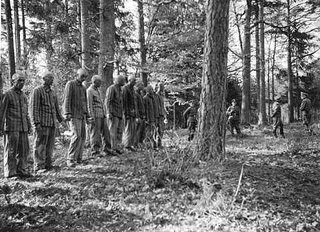 Character building. The idea that you would have to go through the holocaust in order to be able to live with your neighbour in peace is an insane idea, or at least it should be … or is it? My question becomes, how can someone who survived such horrors support an overtly racist political system in Israel? Consider that in Israel today they are putting in place a system modelled after the former apartheid state of South Africa (modelled after the Canadian treatment of our Indigenous peoples population), which includes a wall that divides the land.
Character building. The idea that you would have to go through the holocaust in order to be able to live with your neighbour in peace is an insane idea, or at least it should be … or is it? My question becomes, how can someone who survived such horrors support an overtly racist political system in Israel? Consider that in Israel today they are putting in place a system modelled after the former apartheid state of South Africa (modelled after the Canadian treatment of our Indigenous peoples population), which includes a wall that divides the land.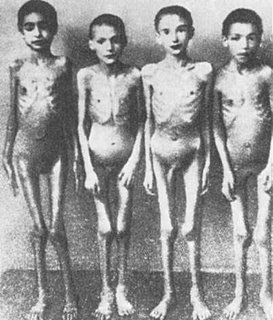 Does that sound like the action of someone who has learned the lessons of history? Someone that has had a character developed by hearing the words of their elders, recounting family histories, folk tales, anything that might convey a sense of morality?
Does that sound like the action of someone who has learned the lessons of history? Someone that has had a character developed by hearing the words of their elders, recounting family histories, folk tales, anything that might convey a sense of morality? Apparently not … and that makes me ask the question that I really don’t want to ask (it grieves me to ask, but to not do so would be irresponsible): I have to ask whether it is possible for a Jew to truly be a Jew while practising hatred of their fellow man; while denying the rights of others, and denying the opportunity of others to live in homes peacefully, without fear. People that have historically been disenfranchised, dispossessed, deported and exterminated should, more than anyone else, be willing to live in peace with their neighbours – regardless of their race or religion.
That is the real problem here: in Israel today the fight isn’t over anything as concrete as land, it is over something far more basic and fundamental in its importance to all involved: the conflict in Israel is over something that will never be resolved while man walks upon the face of the earth. The conflict is over religion.
 Vladimir Lenin, born Vladimir Ilyich Ulyanov, the leader of the 1917 Bolshevik revolution said, “religion was the opiate of the people”. It is very easy to see the truth of this statement is a time when people use religion as the reason for any number of atrocities, all in the name of a “merciful, loving, compassionate, peaceful” God. Of course, with 99 attributes for Allah alone, it is easy to see why religion can be such a divisive issue.
Vladimir Lenin, born Vladimir Ilyich Ulyanov, the leader of the 1917 Bolshevik revolution said, “religion was the opiate of the people”. It is very easy to see the truth of this statement is a time when people use religion as the reason for any number of atrocities, all in the name of a “merciful, loving, compassionate, peaceful” God. Of course, with 99 attributes for Allah alone, it is easy to see why religion can be such a divisive issue. There is an opportunity in Israel for different people to show the world that peace is possible, that there is a different way than war. All they have to do is want it more than what they have right now. That may sound naïve, but it really isn’t as obtuse as it sounds. First, within the Israeli Defence Forces there have been incidences of soldiers and pilots refusing to follow orders when they feel morally opposed to what they have been commanded to do. This is proof that free will trumps the chain of command.
 No more will we have to hear the defence, “I was just following orders.” If an officer orders a soldier to do something that the soldier recognizes to be inhumane, they are morally obliged to refuse to follow through. Similarly, the “neighbours” must do all that they can to ensure that the peace lasts from their perspective. This means that there has to be an absolute zero tolerance for any and all violence.
No more will we have to hear the defence, “I was just following orders.” If an officer orders a soldier to do something that the soldier recognizes to be inhumane, they are morally obliged to refuse to follow through. Similarly, the “neighbours” must do all that they can to ensure that the peace lasts from their perspective. This means that there has to be an absolute zero tolerance for any and all violence.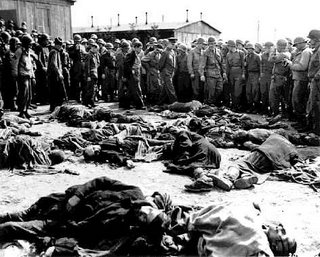 Nobody can go around blowing things up. Kids cannot go around throwing rocks at the IDF, and the IDF cannot fire bullets back when it is not a “proportional” response.
Nobody can go around blowing things up. Kids cannot go around throwing rocks at the IDF, and the IDF cannot fire bullets back when it is not a “proportional” response.If they cannot live in peace, side by side, then they shouldn’t be living there at all. Period. I don’t care if they believe it is their homeland. That’s just a pile of crap: if you want to spill your blood on a pile of dust in a desert because of what the Bible/Torah/Qur’an says, then cut your wrist and get it over with quickly.
If you really want to satisfy God, live next to your neighbour and love them as yourself. If your neighbour’s house burns down, feed and cloth them, help them get back on their feet. Don’t be a neighbour, be a friend … you’ll find it’s very difficult to hate the neighbour that you know by name. In so doing you will both honour your God, and the memory of those who were murdered because of their faith. Israel can be a true memorial.
However, if your intent is to blindly follow the path of a religion that dictates to you that the “Holy Land” is the place for you and your people (alone) to live, then do the world a favour and remove yourself from it.
Throughout the history of the human race has there been a single example of where competing religions have helped resolve significant social issues? I can’t think of any off the top of my head, but of course I haven’t extensively studied this topic … and yet, would I be at all surprised if the answer was a resounding no?
 Would it surprise me if the ultimate truth ends up being that religion is, like opium, a toxic poison to the system, and subsequently something that should be avoided at all costs? Not in the least. If religion gets people to see the land as something to share in peace, while they support each other in their daily lives, Hallelujah. Otherwise, no thanks, I’m not interested.
Would it surprise me if the ultimate truth ends up being that religion is, like opium, a toxic poison to the system, and subsequently something that should be avoided at all costs? Not in the least. If religion gets people to see the land as something to share in peace, while they support each other in their daily lives, Hallelujah. Otherwise, no thanks, I’m not interested.That is all I have to say for now … I’m sure I could go on, but it all boils down to one thing … a joke, in a way, that I told someone a while ago: how do you solve the problems in the middle east?

… no problem. Thus, “could this be where we are headed?”

Tags:




